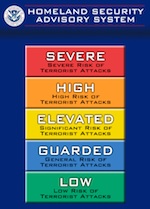"It felt like a movie" was both a sickening and apt descriptor for the September 11, 2001, attacks. The apocalyptic scene was pegged to a part of our consciousness that isn't supposed to intersect with reality, one that's safely tucked away in a world where the human appetite for destruction can be indulged free of any qualms. The collision of these two worlds rippled our cultural fabric, and over the last decade, we've accounted for it.
Here enters our compendium of how ours and other cultures have responded to 9/11. It's meant to be a snapshot, not a comprehensive study. But though the forums are unrelated, its a strangely fluent cross-section of human reaction, from Bollywood's surprisingly lengthy 9/11 film history to the depths of Urban Dictionary.
 The colors on the graphic denote what level of alert our country was on at the time, providing a sense of a nation guided by voices of fear. There is no direct correlation between the colors and the cultural events that we are aware of. Thinking back, most wouldn't even be able to recall exactly when we were on "elevated" or "high" alert, considering the government never provided adequate information to give them context. As you can see, the colors denoting "low" and "guarded" risks -- green and blue -- were never in use during the course of the alert system, and we've been in a perpetual state of "high" risk since 2006. In April of this year, the often mocked color-coded alert system was scrapped for a more specific system of alerting us to terrorism threats.
The colors on the graphic denote what level of alert our country was on at the time, providing a sense of a nation guided by voices of fear. There is no direct correlation between the colors and the cultural events that we are aware of. Thinking back, most wouldn't even be able to recall exactly when we were on "elevated" or "high" alert, considering the government never provided adequate information to give them context. As you can see, the colors denoting "low" and "guarded" risks -- green and blue -- were never in use during the course of the alert system, and we've been in a perpetual state of "high" risk since 2006. In April of this year, the often mocked color-coded alert system was scrapped for a more specific system of alerting us to terrorism threats.
In the first quadrant, we have "revisions," which indicates the films, television and music that were altered, or plucked out entirely, to be more mindful of our history. These changes were attempts to protect ourselves from seeing what was too painful or tasteless for a nation that just didn't find bomb jokes funny anymore -- a lesson Chandler Bing, among others, would soon discover. Many came before 9/11, but had freakish similarities to the attacks, most unfortunate of which was The Coup's album cover showing two members of the group blowing up the twin towers with a detonator. Most of the cultural revisions occurred directly after September 11, when a heightened cultural sensitivity was in effect. Unless you're a fanatic of a particular TV show or film listed here, you were likely unaware that your cultural reality had been manipulated because of reality.
We initially planned to investigate how Hollywood reacted to 9/11. The more we read however, the more we realized Hollywood more or less stayed away. Sure there were supposed cinematic events -- Oliver Stone's "World Trade Center," Paul Greengrass' much-publicized "United 93" (actually a British film). But the cultural significance of Western output disappears next to the body of 9/11 films that came out of South Asia -- India and Pakistan, or more generally, Bollywood. These movies invert what Hollywood might have produced. Instead of the firefighter plagued with an ever-coarsening cough, Hindu wives denounce Muslim husbands, and American prison guards torture them. One film on our timeline, "Khude Kay Liye," isn't technically a Bollywood movie, as it came out of Pakistan's version, "Lollywood" (and became the second highest-grossing Lollywood film ever), but it functioned crucially in both. Pakistan's clerics reviled its anti-fundamentalist stance, while moderates in Pakistan and India welcomed it. It broke the 43-year movie ban between both countries. Now, for every Bollywood movie exported to Lollywood -- where the post-"Khuda Kay Liye" renaissance still pales next to India's movie machine -- India will show one from Pakistan.
American language, however, seemed to us irrevocably changed. Phrases like "too soon" and "never forget" evolved from campaign sloganesque refrains into tossed-off colloquialisms, or punch lines aimed at the kind of sentimentality that defined the last months of 2001. Expressions of pain turned into ironic proof of hindsight. But a scan of the past decade on Urban Dictionary -- a site that's cornered the ironic distance market -- revealed its own kind of sentimentality. The second anniversary of 9/11 inspired a moving "9/11" entry (we've placed the words on the timeline according to their date of creation), and the last entry is "Osamnia," written by someone on the night Osama died to describe why sleep that night was impossible.
These words most directly relate to our final "history" section. Similar to the alert backdrop, this section is not meant to superimpose meaning on the cultural events, but simply functions as a guide to our nation's psyche during significant moments, from the unfathomably disturbing "shock and awe" campaign to the wave of euphoria following Barack Obama's victory. While our memories of the events of the past 10 years may have dulled with time, these are unmoving markers that, unlike culture, cannot be revised.
Infographic built by Mike Sparks
Click on the squares for video and images of post-9/11 culture: